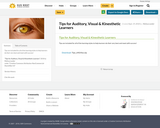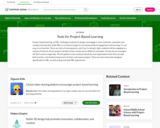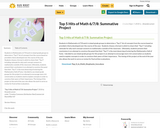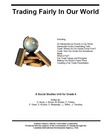
Tips are included for all of the learning styles to help learners do their very best and meet with success!
- Subject:
- Education
- Material Type:
- Activity/Lab
- Reading
- Date Added:
- 09/19/2018

Tips are included for all of the learning styles to help learners do their very best and meet with success!

From bringing you closer as you share stories to having a special time together at the end of the day, reading aloud to your children has many benefits. Reading isn’t just a part of the school day but a lifelong practice you can reinforce and celebrate at home. You can share favorite books, explore new titles, and read aloud together.
What does it look like to read aloud to your children? A child who might not read independently can sit with you side-by-side as they listen to you read a picture book. Independent readers might take turns reading aloud a chapter book with you as you explore a favorite book from your childhood. The possibilities are endless!
In this blog post, Monica Burns has nine tips for reading aloud to your children. Reading aloud can happen at any age.

This art history video discussion considers Titian's "Christ Crowned with Thorns" c. 1570‰غز76, oil on canvas. Alte Pinakothek, Munich.

This week we’re exploring aerospace engineering and its two main fields: aeronautical engineering and astronautical engineering. We’ll explore life & buoyancy, propulsion systems, and the challenges of managing the human body in space.

The Toastmasters Podcast is like a radio talk show featuring interviews with Toastmasters usually featured in the Toastmaster magazine. But unlike a radio show, a podcast is on the Internet, and available, for free, to anyone in the world with an Internet connection, and a connected device capable of playing audio. 150+ episodes are at ToastmastersPodcast.com

Niimin shows Janaye some Fancy Shawl Dancing footwork, and shows off her skills in Studio K.Make sure and SUBSCRIBE to be the first to know about new shows, ...

Most people dislike feeling uncomfortable. There are many different ways that humans can feel uncomfortable…we can be hot, cold, tired, in pain, hungry, unwell, and the list could go on. The type of discomfort we will be talking about in these modules is emotional discomfort, or what is often called distress. We may not like it, but experiencing uncomfortable emotions is a natural part of life. However, there is a difference between disliking unpleasant emotions and experiencing unpleasant emotions as unbearable and needing to get rid of them. Being intolerant of experiencing emotional discomfort can interfere with living a fulfilling life, and can escalate any emotional discomfort we might be experiencing.

This lesson provides teachers with support for using text-dependent questions and Common Core literacy strategies to help students derive big ideas and key understandings while developing vocabulary using the text "Tomas and the Library Lady". With the help of the English-speaking local librarian, Spanish-speaking Tomas is encouraged to assume the role of family storyteller, finding that he cannot only be a learner but a teacher as well.

Canadian Kindergarten through Grade 12 Educators – Investigate the effects of outer space on seed germination with your class. Tomatosphere™ is a hands-on program that builds scientific inquiry and experimentation skills.

Tomatosphere™ offers an excellent opportunity to have your students think and act like scientists as they practice their inquiry skills and develop understandings of the nature of science and the concept of a fair test.
In the spring, participating classrooms receive two packages of tomato seeds. One package contains seeds sent into space or treated in space-simulated conditions. The other contains untreated "control" seeds. Students plant the seeds and conduct experiments to explore the effects of the space environment on the germination of tomatoes. Through Tomatosphere™, students learn how to conduct a scientific experiment and compare the number of seeds that germinate for the two groups of seeds.
While completing the Tomatosphere™ program, students investigate how to supply space exploration missions with life-support requirements—food, water, oxygen and a way to consume the carbon dioxide exhaled by astronauts—while also discussing the many issues and research involved in space exploration.
Teachers can expand on the basic Tomatosphere™ Seed Investigation by connecting it to studies of plants, space, nutrition, math or the environment, depending on grade and curriculum.

Download Free Conversation Strategies. Use our Quick Guide to Conversation Strategies to increase active engagement in lessons and meetings.

"Download our Toolkit for Promoting Empathy in Schools. You can download the toolkit in Spanish, French, and Korean, too.
The Start Empathy Toolkit is the product of interviews with more than 60 educators and leading social entrepreneurs. We asked quite simply, “What works?” We wanted to know what it would take to create a classroom where kids’ social and emotional needs are met and how to cultivate the kinds of skills that are critical for success in today’s (and tomorrow’s) world. The result is not a prescription or a formula, or a silver-bullet fix. Consider this a living set of tools: tools that will grow and evolve over time, as each of us adds our own. We encourage you to think beyond your classroom walls to what it takes to mobilize your entire school community. Together, let’s creatively reimagine what changemaking education can look like.
The toolkit contains the combined wisdom of dozens of teachers, organizations, and people who live this everyday: tips and tools, lesson plans and examples, and, most importantly, insights that can help inform everything from how you design your classroom to your daily interactions with students and colleagues. Some exercises can be done in as little as two minutes, while others can take the form of months-long class projects, applied to a range of subjects. Others simply offer a strategy you can adapt to your existing lesson plans, and tips that are proven to improve teacher and student performance alike. Some you may be familiar with, and others may be new. We invite you to test these in your classroom, and use them to generate ideas of your own."

This website is a great place to find resources (that need to be purchased) to support the development and implementation of a sound wall in your classroom.

Project-based learning, or PBL, challenges students to design and engage in more authentic, extended, and complex learning. But while PBL is a trusted strategy for increasing student engagement and learning, it's not easy to orchestrate. There are tons of moving pieces, and if you're doing it right, students will be engaging in a variety of interest-driven projects all with various needs and on different schedules. So how do you manage it all? Tech can be a huge help. This list gathers some useful productivity and organization tools that can help both teachers and students keep track of, finish, and assess projects. There are also a few tools designed specifically for PBL, as well as plug-and-play PBL experiences.

Students in Mathematics 6/7/8 work in mixed-grade groups to determine a “Top 5” list of concepts from the course based on provided criteria developed over the course of the year. Students choose a format in which to share their “Top 5” including rationale for why each concept connects to mathematics outside of the classroom. Ultimately, students present their conclusions in an attempt to convince the panel that their “Top 5” is the most deserving of entering the Mathematics Hall of Fame. I decided to use mixed-grade groups for this project in an attempt to encourage more rich conversation as students need to explain concepts in order to convince their peers of their importance. The timing of this project at the end of the year also allows the work to serve as review for final written evaluations.

Top Ten Experiments to do at Home includes:
- Experiments for Biology - Extracting Fruit DNA, Simple Digestion Experiment
- Experiments for Earth Science & Astronomy - Explore Convection Currents, Explode a Volcano, Watch the Crayon Rock Cycle, Eat the Moon Phases
- Experiments for Chemistry - Marker Chromatography, Make a Polymer Slime
- Experiments for Physics - Lego Balloon Car, Homemade Water Clock
If you need some help with doing experiments in your home, you will find a link that gives you "21 tips for Hands-on Science!" at the bottom of the post.

Toy Theater playfully teaches conceptual foundations with online interactive games and activities that have real educational value. Find resources for math, reading, art, music, puzzles and games.

This activity explores the role of the buffalo in the lives of the American Indians of the northern Plains. For centuries, the American bison--commonly called the buffalo--has been revered by various Native American peoples. The buffalo still plays a central role in many American Indian cultures. Stories passed from generation to generation--by spoken word and by pictures painted on animal hides--record the history of American Indians and the buffalo.
Website sections include:
- You be the historian
- What can you make from a buffalo?
- Background Information
More about the buffalo hide painting
Meet the artist
Map of the Plains Indians
- Classroom Materials
Make your own buffalo hide painting
Student worksheet
Teacher guide

In which Stan Muller teaches you about our third branch of Intellectual Property, trademarks. A lot of people confuse trademark and copyright. Trademarks apply to things like company and product names and logos, packaging designs, and commercial designs. Basically, copyright protects ideas, but trademarks protect the things that help consumers tell companies apart. This ensures that consumers know the source of the goods they're buying. Without trademarks, it would be really difficult to buy the same product twice, and very easy for unscrupulous companies to pass off fakes and knock offs of the products you want. I'm telling you, you like trademarks.

An excellent resource from the Eastern Ontario Catholic Curriculum Cooperative. This resource includes an in-depth simulation to place students into the “shoes” of those living in poverty. “This unit will help engage students to actively explore international trade, development and co-operation issues as they pertain to Canada, its trading partners, and the fair trade system.”